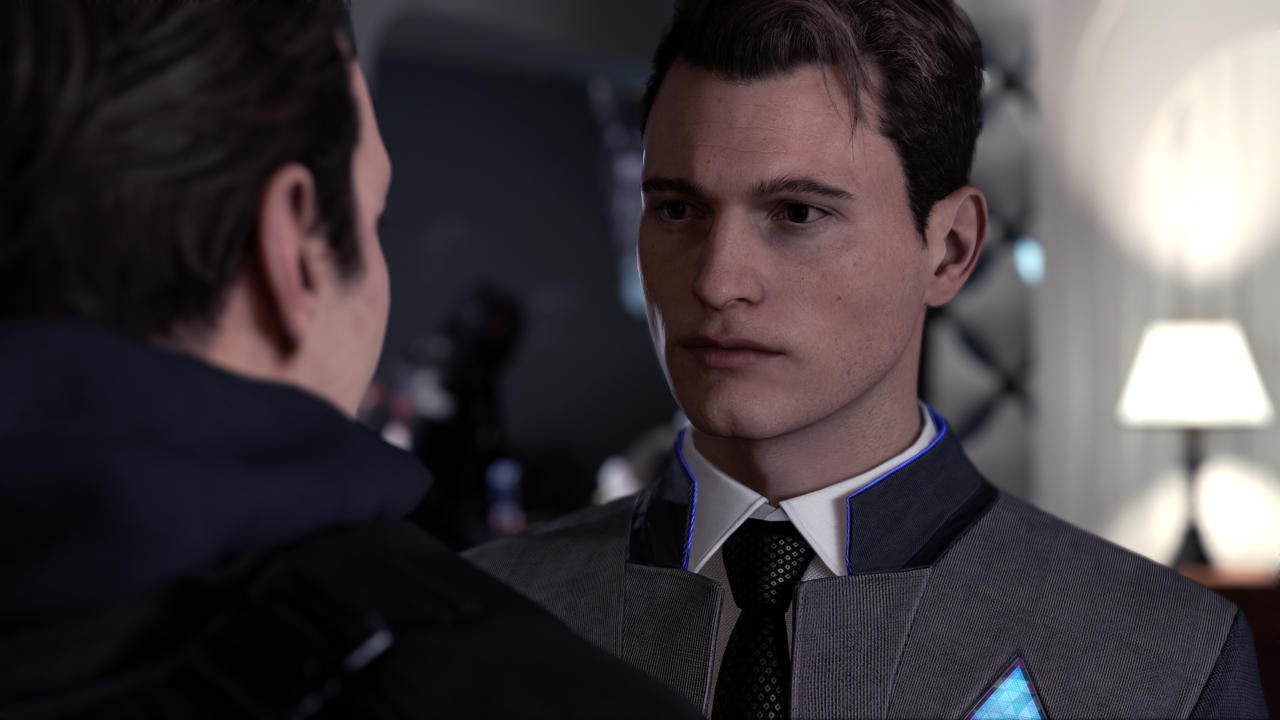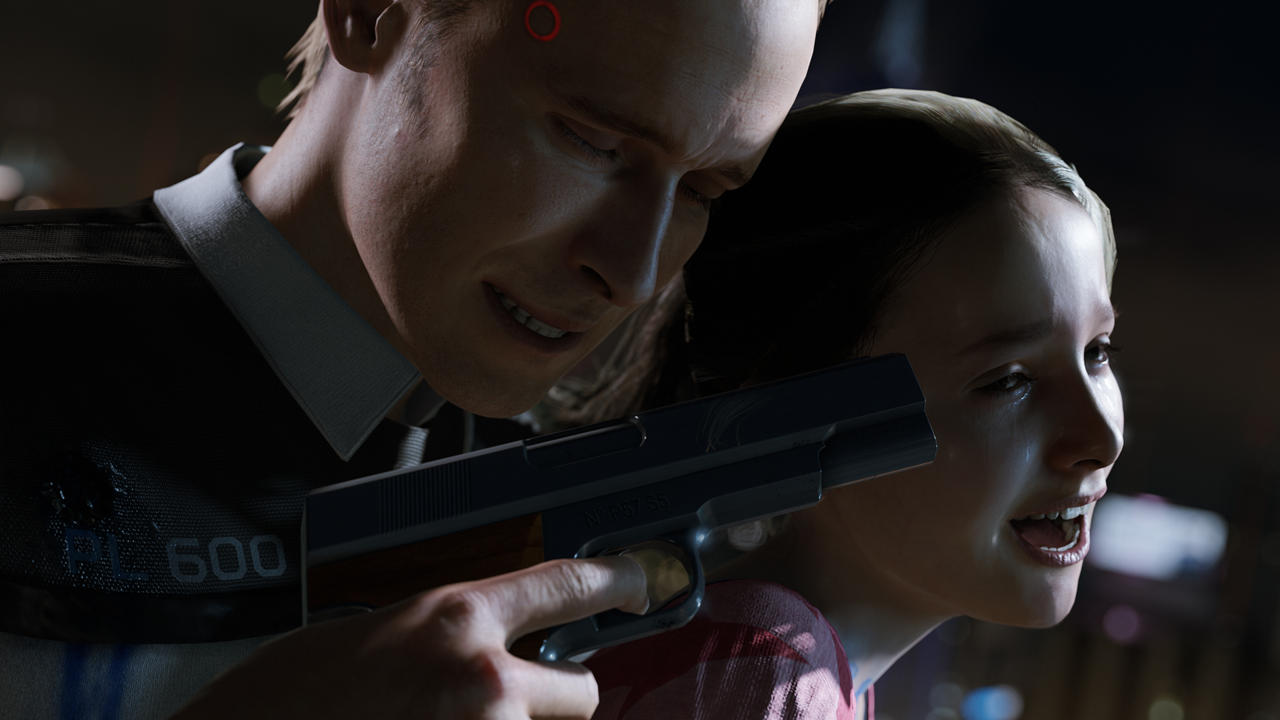Things have been somewhat quiet for Quantic Dream for the last year or so, at least in terms of games. The developer's last title, Detroit: Become Human, released in May 2018, and elicited a generally positive reaction from critics and players. While it featured a trope-heavy story that achieved mixed results in attempting to tackle some of its big ideas, like racism and xenophobia as seen through a sci-fi "humans versus robots" lens, Detroit was an impressive feat in terms of bringing the performances of human actors into video game worlds.
A little more than a year after the release of Detroit, Quantic Dream CEO, writer, and director David Cage turned up at San Diego Comic-Con 2019 for a panel featuring several actors from Detroit and another of the studio's past games, Heavy Rain. The panel dug into the motion capture technology used to create those games and capture the actors' performances to bring them into a digital world.
While it's not clear what Quantic Dream is working on next and Cage didn't announce anything during the panel, things have changed for the studio. For more than the last decade, Quantic Dream's games have been PlayStation exclusives, thanks to a partnership between the developer and Sony. That partnership has ended, however, with Quantic Dream taking its games multiplatform with an investment from Chinese publisher NetEase.
Before that, Quantic Dream made headlines for another reason: as Eurogamer reported, Quantic Dream lost a lawsuit that alleged the studio created a toxic workplace culture for employees. Those allegations arose from an investigation by journalists from Le Monde, Canard PC, and Mediapart published in January 2018.
Ahead of Quantic Dream's panel, Cage sat down with GameSpot for a brief interview about the studio's post-Sony situation and the technology it used to create Detroit. Cage refused to comment on the lawsuit or Quantic's workplace culture when we asked about them, but he did discuss where the studio is headed in the future and where it's turning its focus in terms of developing games and technology.

GameSpot: It's been more than a year since the release of Quantic Dream's last game, Detroit: Become Human, and you've moved away from your partnership with Sony, right? So what is going on with Quantic Dream right now?
David Cage: Sure. So we worked exclusively with Sony for the past 12 years, and it's been absolutely a fantastic partnership with them, we really enjoyed working with them, and we had a lot of creative freedom and the liberty to do the games we wanted to make, which was absolutely amazing. But after 12 years working together, we felt that it was time for us maybe to explore different routes and to do different things, and we also wanted to become publishers and really work on our titles, maybe work on more than one title at a time. Also, we see the landscape changing very fast, we see new platforms, we see mobile, and we see cloudplay, and we wanted to just be able to be part of this landscape.
And that's really what motivated us initially to look around, and so we started talking to different people and very quickly we found that the people at NetEase--that is the fifth-largest publisher in the world, although they may be less famous than other publishers right now, but they're pretty big. But we met people that we really like and who understood what we were doing, understood our vision, and just wanted to help us to grow and to explore different possibilities. It gives us the same freedom, give us the support we needed for our new ambitions, but we want to be even more ambitious than we've ever been and just continue creating games that are different.
Does that mean creating games that are different from what we've seen from you before, like Detroit and Heavy Rain?
Sure, we are working around on different projects, and that's also something we wanted to do for a long time. Putting the same passion and the same enthusiasm and exploring maybe different jobs. An important part of what we wanted to do was to become a publisher to publish our own games, that was something important to us, but also to work with other developers, and not necessarily regarding interactive storytelling, but any genre. As long as it's original, innovative, and high-quality, we are interested. And we have been in this industry for 22 years, so we just felt that maybe we could also share the experience we had being a developer ourselves for a long time, sharing access to motion capture, to soundstages, to actors, to talents, to outsourcing, all the industrial advantages that we may have. Technology also could be shared. And just give a chance to other developers to get access to this fantastic market and to gamers, and just help them the best we can.
Can you tell us anything about what you might be working on or what you might be working on publishing? Anything like that?
No, we don't have any announcement to make, but we are very actively working on this right now, and it's so exciting, really exciting. You know, I'm in this industry for 22 years, and it feels like it's a startup company, and we're starting a new adventure now, so I wouldn't say it's a new journey because we've been on this journey for a long time, but it feels very exciting. And it's very exciting times for the industry in general with cloud play, with different platforms arriving, with new possibilities--but also meeting other developers. Being a publisher now allows us to meet different people and to see how much talent there is in this industry.

Your Comic-Con panel is about technology, so can you talk about Quantic Dream's work in that area? You worked on motion capture technology for Detroit--are you still developing in that area?
Oh yeah, I mean, we are a very strange developer, to be honest with you, because we've always developed our own tech. From the first day 22 years ago, it was our own engine, our own tools, our own everything. And since then, we keep developing our own technology. We have about 50 engineers working full-time on the tech, and it allows our games maybe to look a bit different, and really, to have the tech that is tailored to the type of games we make. So cinematography is a big thing, actors--and virtual actors--are a big thing in what we do, filming, lighting. All these things are absolutely critical in this type of game. We developed the technology that fully supports this vision.
Regarding motion capture, we are one of the very few developers in the world that invested in a motion capture set about 20 years ago, and since then, we kept upgrading it and improving it …. But it's something that proved to be, absolutely, a strategic investment 20 years ago, and when you look at a game like Detroit, I don't think this game could have been made if we didn't have our own motion capture set internally, because absolutely the entire game is in performance capture, so it's literally 360 days of shooting with about 300 actors. We had stunts, we had kids, we had an absolutely massive cast of different profiles of actors. It could only be made this way because we mastered the technology of motion capture.
And we learn game after game, and we improve, and we also developed a very specific technology regarding facial animation. Most studios out there use a headset for actors, and you've probably seen that in “making of” videos and stuff, but there are usually two cameras with a lamp that they set in front of you, and it's kind of intrusive for actors and very difficult for them to focus on their emotions, just because they have these things looking at them, the lamp in their face. You also can't shoot when characters get closer, or they talk more intimately, or they kiss or whatever, or they hug each other. You can't do this kind of thing. So we started developing a technology 20 years ago that is purely based on markers, so it's just little dots on the face, and no headsets, no wires, nothing. It's just purely markers, and it's fantastic for actors because it's complete freedom, it's not intrusive, they totally forget about their markers, and it also allows you to track eyes, which is also very special. Eyes are so important in order to communicate emotion.
That's one of the things we did love. And we have many things at the moment in the work regarding the engines, the tools, but also performance capture, of course. We keep improving game after game, we keep investing in R&D, and we hoped that the next game would look a thousand times better than the previous one.

With some distance on Detroit, even from a creative standpoint and from a tech standpoint, how do you feel about that game? Is there anything you'd change or do differently?
I think everyone at Quantic Dream is really proud of Detroit. It's been a lot of work, but it's also what we wanted it to be, which is a game where the player tells his own story through his actions. The branching narrative was a very important aspect for us, and from what I hear from gamers, I mean, it worked for them. It really gave them the feeling of telling their own story. Very proud of the work done with the actors. we were very lucky to find very talented actors like Bryan Dechart [who plays Connor] and Jesse Williams [who plays Markus].
Honestly, I think that Detroit is probably as good as we could do at the time. So, I have absolutely no regret on the game. I think it's pretty much what I had in mind. It's much better because of the contribution of actors who did a fantastic job.
Now, game after game, you know that technology evolves and new platforms arrive, and you want to boost the realism further. And we were talking about photorealism for years in the industry, and game after game, we are trying to get closer. And I think Detroit looked better than Beyond, Beyond looks better than Heavy Rain, etc., etc. So I think the next game we will try to push the envelope.
I think that lighting is going to be a key thing. There is this new technology called “ray tracing” that we talk a lot about these days. I think this is going to be interesting because it will allow to improve reflections, lighting, shadows. And I think that's a big deal. For years, I mean, the amount of polygons you could display was key, then it became the shaders and then textures, and now I think it's all about the lighting, and the more subtle and nuanced the lighting will be, the better the image will be. I don't think it's going to be a war about resolution; I know that people talk about 8K these days and blah blah blah. I don't think this is the real next battle. I would rather put focus on lighting. Lighting, lighting, lighting.

